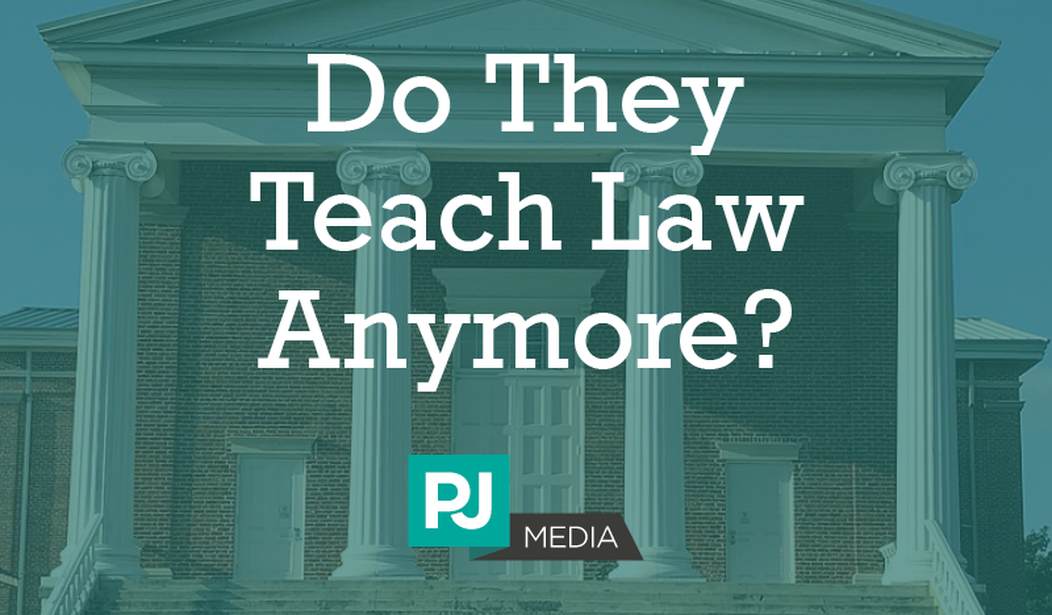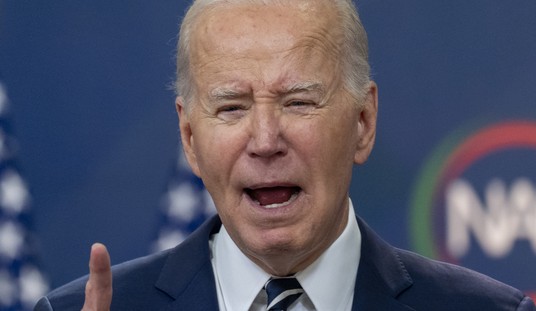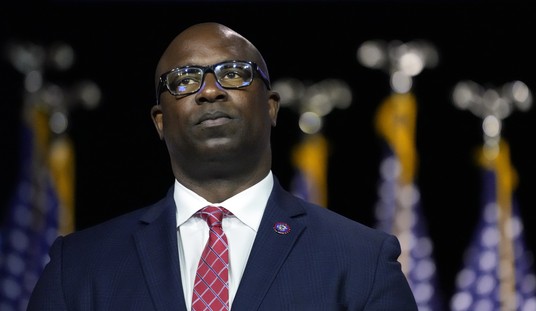Note: This is the third in a ten-part series at PJ Media examining what our nation’s top ten law schools are teaching. Hans von Spakovsky and I will undertake a deep dive into what is being taught in America’s top ten-ranked law schools. You can read the first two articles here and here.
Elite law schools have become training academies not so much for effective and competent lawyers, but instead for militant transformational radicals with law degrees.
Mainstream consumers of legal services, otherwise known as paying clients, would be shocked by the evolution that has taken place in the nation’s elite law schools. Instead of producing lawyers capable of helping clients, these schools now turn out leftist activists who are most competent at using transformational designs to upend centuries of legal traditions and institutions, including, ultimately, the U.S. Constitution itself.
Too many Americans still think a law degree from Harvard means that the graduating lawyer is competent to practice law. The opposite is becoming more true.
Harvard, Yale, and the elite law schools are graduating increasing percentages of incompetent lawyers, at least when it comes to what lawyers have long done: practice law.
Hans von Spakovsky and I will march through the top ten rankings by U.S. News and World Report and share with you what is taking place inside these law schools. The militancy and uselessness of the curriculum may astound many of you.
I already exposed the top-ranked law school—Yale—and Hans covered number two, Stanford, a place now renowned for having a swarm of proto-totalitarian law students, so much so that a federal judge refuses to hire clerks from there anymore.
Up next is the third-ranked institution, the University of Chicago Law School.
Chicago has a reputation for being a “conservative” law school. Maybe in relative terms compared to Stanford or Yale, but don’t be tricked. Maybe two decades ago. While Chicago is relatively better than Yale, crazy still reigns there, as you will see below.
Chicago suffers from the same obsession with DEI and even has a dedicated DEI portal for reporting to authorities. Chicago even still pesters students to wear masks.
Carrying a price tag of $106,563 per year, law students at Chicago take a whole host of useless courses that do next to nothing to prepare them to practice law. Like Yale and Stanford, space limitations make it impossible to document all of it. So let’s take a stroll through some of the course catalog.
Naturally, race is the single most important topic for the deconstructed law school curriculum. Instead of contracts and torts, at elite law schools these days, it is more important to teach deconstructive philosophy disguised as law. It is better to stoke racial grievances than focus on lawyer fundamentals. The University of Chicago law school is no different in providing a smorgasbord of grievance courses like “Critical Race Studies”:
This course provides an introduction to critical race theory through reading canonical works by critical race scholars; it explores a selection of current legal debates from a critical race perspective; and it contextualizes critical race theory through the study of related movements in legal scholarship, including legal realism, critical legal studies, and social science research on discrimination and structural racism. We will attempt to identify the ways in which critical race scholarship has influenced, or should influence, legal research and law school pedagogy.
If the students become emotionally disgusted by free speech or visits by conservative federal judges, they can examine their emotions and whether these emotions—like at Stanford—might justify banning certain behavior. Chicago Law School has a course for that called “Emotions, Reason and the Law.”
Emotions figure in many areas of the law, and many legal doctrines (from reasonable provocation in homicide to mercy in criminal sentencing) invite us to think about emotions and their relationship to reason. In addition, some prominent theories of the limits of law make reference to emotions. (Thus Lord Devlin and, more recently, Leon Kass have argued that the disgust of the average member of society is a sufficient reason for rendering a practice illegal, even though it does no harm to others.
There are more courses at Chicago that might disgust the average member of American society. Consider the highly marketable course “Public Law in the Time of Trump.” The course is so full of rank bias that law professors from all over the country were invited to pile on via Zoom:
Recent events, including President Trump’s controversial policies and actions, the COVID-19 pandemic, and nationwide protests over policy brutality, have placed a strain on administrative law and institutions in the United States. In this seminar, invited speakers from other law schools will present scholarship that examines these developments. The seminar serves the dual purpose of introducing students to scholarly approaches to understanding contemporary events, and educating them about the relevant administrative and constitutional rules, particularly those that address crises and fast-changing problems.
We get it: academic credit for exhibiting Trump Derangement Syndrome at the nation’s third-ranked law school.
The clinics at the University of Chicago are where students might actually learn how to practice law, but even these have a heavy dose of leftism. The bias turns these clinics into tools to train leftist activists to break down established legal and American norms. A brief fly-by:
Students in the “Abrams Environmental Law Clinic” “promote clean energy, fight against water pollution, protect natural resources and human health, and address legacy contamination… The Clinic represents regional and national environmental organizations and individuals and often works with co-counsel. In addition to litigation, the Clinic may also engage in legislative reform and rule-making efforts; students interested solely in that kind of work should notify the instructor before joining the Clinic.”
The “Civil Rights and Police Accountability Project” “is one of the nation’s leading law civil rights clinics focusing on issues of criminal justice. Through the lens of live-client work, students examine how and where litigation fits into broader efforts to improve police accountability and ultimately the criminal justice system. Students provide legal services to indigent victims of police abuse in federal and state courts. They litigate civil rights cases at each level of the court system from trial through appeals.”
No clinics appear to offer opportunities to work with the police.
The “Immigrants’ Rights Clinic” “provides legal representation to immigrant communities in Chicago, including individual representation of immigrants in removal proceedings, immigration-related complex federal litigation, and policy and community education projects on behalf of community-based organizations… Past and current projects include the first challenge to indefinite detention under the PATRIOT Act, a civil rights lawsuit alleging Fourth and Fourteenth Amendment challenges against state law enforcement involved in an arrest that led to deportation, litigation against ICE detention centers for conditions of confinement during the COVID-19 pandemic.”
No clinics appear to be offered to work with Department of Homeland Security lawyers.
In the “Poverty and Housing Law Clinic,” students will “represent tenants facing unwarranted evictions, and prevent landlords from performing lockouts or refusing to make necessary repairs. All students will be expected to interview clients, prepare written discovery, conduct research, and draft motions. In addition to working 12 hours a week at LAF, students will attend a weekly two-hour class to learn about subsidized housing programs, eviction actions, housing discrimination, representing tenants with disabilities, the intersection between domestic violence and housing, and the extensive and often misunderstood connection between criminal law and housing.”
Unlike Yale and Stanford, Chicago does have some clinics that are not completely bonkers, teaching things like trial advocacy, entrepreneurship, and corporate formation. But other nutty courses at Chicago make up for it.
Students feeling especially guilty can take “Global Inequality,” where students will learn virtually nothing that a client is willing to pay for on the open market.
Global income and wealth are highly concentrated. The richest 2% of the population own about half of the global assets. Per capita income in the United States is around $47,000 and in Europe it is around $30,500, while in India it is $3,400 and in Congo, it is $329. There are equally unsettling inequalities in longevity, health, and education. In this interdisciplinary seminar, we ask what duties nations and individuals have to address these inequalities and what are the best strategies for doing so.
If you are a true-crime fan, Chicago Law has a course for you: “History and Theory of Policing” in America. Just don’t expect it to help in the courtroom or writing briefs.
We will read from classic texts that influenced the way those who think and write about the police, as well as the police themselves, view the role of the police in American society.
Another highly marketable course is “The New Abolitionists.” What’s that about, you wonder? Ending abortion? Opposing human trafficking?
Wrong answer.
This Chicago Law course is about the movement to abolish prisons. Taught by Professor Adam Davidson, who says he is in the business of “dismantling systems of oppression,” the course “will discuss the current movement to abolish police, prisons, and the prison industrial complex more broadly. We will read the work of academics and activists like Mariame Kaba, Allegra M. McLeod, Ruth Wilson Gilmore, Angela Davis, and others, who are writing within and about this movement.”
Nothing demonstrates a well-prepared young lawyer more than schooling in the works of Angela Davis.
If race bores Chicago law students, there is plenty of courses about sex.
Professor Mary Anne Case, a graduate of Harvard Law School and Yale, teaches many.
Case, who rails against Catholics, conservatives, MAGA, Trump, Catholics some more, Justice Barrett, Republicans as Nazis, coal, and, finally, Catholics, teaches “Regulation of Sexuality”
This course explores the many ways in which the legal system regulates sexuality, sexual identity, and gender and considers such regulation in a number of substantive areas as well as the limits on placed on such regulation by constitutional guarantees including free speech, equal protection, and due process.
I’m sure all diverse points of view are represented in the instruction. If regulation of sex isn’t enough sex, Chicago has other Case courses, including “Regulation of Family, Sex, and Gender” and, of course, “LGBT Law.”
Expect Chicago to add courses in QIA2s+ law shortly.
In fairness, Chicago is bad, but not off the rails to the same degree as Yale and Stanford law schools. Chicago is teaching useless leftist courses of the sort that Harvard taught almost a decade ago when I first asked in 2015, “Does Harvard Teach Law Anymore” here at PJ Media.
Regardless, Chicago is another top-ten law school where students saturated in ideology are graduating ill-prepared to appear in court and represent paying clients. It is part of the extremist drift of our nation’s elite law schools, and is an important part of the story of how America has crept toward bigger government, diminished liberty, growing authoritarianism, and hostility toward American values that built civilization and rescued the world from dictatorship on at least one occasion.
Hans von Spakovsky and I will march through the remaining top-ten law schools. Hopefully, by the end, you will ask yourself whether you want your lawyer to be from Yale or a saner law school like the University of Alabama or West Virginia University.









Join the conversation as a VIP Member